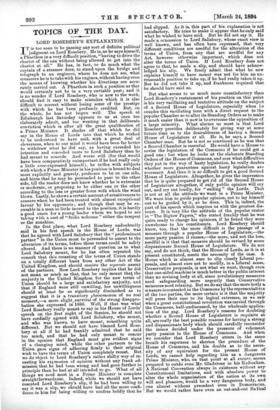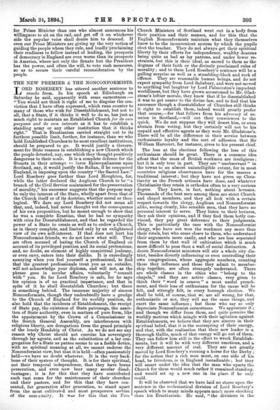TOPICS OF THE D.Y.
LORD ROSEBERY'S EXPLANATION.
IT is too soon to be passing any sort of definite political judgment on Lord Rosebery. He is, as he says himself, a Phaethon in a very difficult position, " having to drive the chariot of the sun without being allowed to get into the chariot at all." He has, in fact, to do much what the captain of a steamer does, to stand upon the bridge and telegraph to an engineer, whom he does not see, what measures he is to take with his engines, without having even the means of knowing whether his directions are accu- rately carried out. A Phaethon in such a position as that would certainly not be in a very enviable post ; and it is no wonder if Lord Rosebery, who is new to the work, should find it easy to make mistakes which it is also difficult to correct without losing some of the prestige with which he has been profusely credited. But, on the whole, he has not begun well. The speech at Edinburgh last Saturday appears to us at once too elaborately adroit, and too wanting in that deliberate conviction which is after all the great qualification of a Prime Minister. It shades off that which he did say in the House of Lords into that which he wished to be understood to have said, with a great deal of cleverness, when to our mind it would have been far better to withdraw what he did say, as having exceeded his intention and conceded more to Lord Salisbury than he had meant to concede. And worse still (for that would have been comparatively unimportant if he had really only a little over-expressed himself), he trifles with subjects with which a Prime Minister in his position is bound to deal most explicitly and gravely, professes to be on one side, and hints that he may be persuaded to pass to the other aide, till the reader does not know whether he is extremist or moderate, or proposing to be either one or the other according to the less or greater force with which the wind blows. Lastly, he shows a certain amount of sensitiveness to censure when he had been treated with almost exceptional favour by his opponents ; and though that may be ex- cusable in a man so little inured to the position, it is hardly a good omen for a young leader whom we hoped to see taking with a sort of "frolic welcome" either the tempest or the sunshine.
In the first place, what Lord Rosebery undoubtedly said in his first speech in the House of Lords. was that he agreed with Lord Salisbury that the " predominant partner" in the Union must be persuaded to assent to the alteration of its terms, before those terms could be safely altered. And there is no manner of question as to what Lord Salisbury meant, for he has often repeated the remark that this recasting of the terms of Union stands on a totally different basis from any other Act of the United Kingdom, and should receive the separate assent of the partners. Now Lord Rosebery implies that he did not mean as much as that, that he only meant that the majority in the United Kingdom for the new terms of Union should be a large and satisfactory majority, and that if England were still unwilling, her unwillingness should at least be so significantly diminished as to suggest that it is a transitory phenomenon of no real moment,—a mere slight survivalof the strong disappro- bation she expressed in 1886. Well, if that was what Lord Rosebery really meant to say in his House of Lords' speech on the first night of the Session, he should not have cordially agreed with Lord Salisbury, who meant, and who was known to have meant, something quite different. But we should not have blamed Lord Rose- bery at all if he had frankly admitted that he said too much, and that he had only meant to concur in the opinion that England must give evident signs of a changing mind, while the other partners to the Union gave signs of adhering firmly to their original wish to bave the terms of Union completely recast. But we do object to Lord Rosebery's rather shifty way of re- casting his expression of opinion without any frank ad- mission that he had been wrong and had gone further in principle than he had at all intended to go. What of all things we need most in a Prime Minister is complete straightforwardness. Indeed, while we should not have resented Lord Rosebery's slip, if he had been willing to say it was a slip, we should have had all the more confi- dence in him for being willing to confess boldly that he had slipped. As it is, this part of his explanation is not satisfactory. He tries to make it appear that he only said what he wished to have said. But he did not say it. He made a concession to Lord Salisbury, whose exact view is well known, and has often been expressed, that very different conditions are needful for the alteration of the terms of Union, from any that are needful for any Act, however otherwise important, which does not alter the terms of Union. If Lord Rosebery does not agree to that, he made a slip, and should have acknow- ledged his slip. We freely admit that what he now explains himself to have meant was not for him an un- reasonable position to take up, if he had really taken it up. But he did not take it up, and frankness required that he should have said so.
But what seems to us much more unsatisfactory than Lord Rosebery's restatement of his position on this point is his very vacillating and tentative attitude on the subject of a Second House of Legislature, especially when he couples this vacillating tone with a direct request to the popalar Chamber so to alter its Standing Orders as to make it much easier than it now is to overcome the opposition of a large minority. What alarms us most is that Lord Rosebery provides deliberately for giving way at some future time as to the desirableness of having a Second House of Legislature at all. He is, he says, a Second Chamber man. But he is not so convinced as he was that a Second Chamber is essential He would have a House to revise the legislation of the Commons if he could get a. good one ; but when he looks at the elaborate Standing Orders of the House of Commons, and sees what difficulties they put in the way of hasty legislation, he really doubts whether more guarantees against hasty legislation are necessary. And then it is so difficult to get a good Second House of Legislature. Altogether, he gives the impression that he is quite prepared to get rid of the Second House of Legislature altogether, if only public opinion will cry out, and cry out loudly, for " ending " the Lords. That is not at all the attitude we want in a Prime Minister. We want him to guide popular opinion, not to lay himself out to be guided by it, as he does. This is, indeed, the part of his speech which inspires us with the greatest dis- trust. It is very like the attitude of the popular orator in " The Biglow Papers," who stated frankly that he was quite ready to change his opinions, if he found they were unwelcome to his constituents. Lord Rosebery should know, too, that the more difficult is the passage of a measure through a popular House of Legislature,—the more party passion it rouses,—the more, and not the less, needful is it that that measure should be revised by some dispassionate Second House of Legislature. We do not say, and do not think, that the House of Lords, as it is at present constituted, meets the necessity of the case. A House which is almost sure to clip closely Liberal pro- posals, and almost sure not to modify, in a Liberal sense, Conservative proposals, is not what we want, though even that one-sided machine is much better in the public interest than no revising body at all, since revolutionary measures need safeguarding more urgently than Conservative measures need relaxing. But we do say that the more hotly a. measure is contested in the Commons by the representatives of the two parties, the more certain is it that the majority will press their case to its logical extremes, as we saw when a great constitutional revolution was carried through the Commons, half-undiscussed, by the wholesale applica- tion of the gag. Lord Rosebery's reasons for doubting whether a Second House of Legislature is requisite at all, are really the best possible reasons for having a strong and dispassionate body which should carefully reconsider the issues decided under the pressure of vehement party passion in the House of Commons. And when we consider that Lord Rosebery utters in the same breath his eagerness to shorten the procedure of the House of Commons, and his doubts as to the neces- sity of any equivalent for the present House of Lords, we cannot help regarding him as a dangerous Prime Minister, who, on that point at all events, seems prepared to outdo even Mr. Gladstone in his Radicalism. A National Convention always in existence without any- Constitutional limitations, and with absolute power to alter the whole organisation of the nation at its own will and pleasure, would be a very dangerous body, and one almost without precedent even in Democracies. But we would rather have even an out-and-out Radical for Prime MiniEter than one who almost announces his willingness to sit on the rail, and get off it on whichever side the popular voice shall desire him to descend. If even our Prime Ministers are giving up the very notion of guiding the people whom they rule, and loudly'proclaiming their readiness to follow instead of leading, the prospects of democracy in England are even worse than its prospects in America, where not only the Senate but the President has the power, and often the will, to veto rash measures, so as to secure their careful reconsideration by the people.



































 Previous page
Previous page